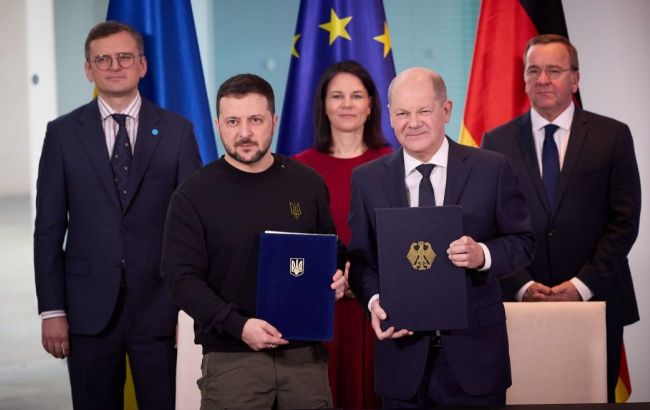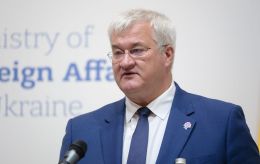10-year security commitments: What Ukraine gains from agreement with Germany
 Volodymyr Zelenskyy and Olaf Scholz signed a security agreement (Photo: president.gov.ua)
Volodymyr Zelenskyy and Olaf Scholz signed a security agreement (Photo: president.gov.ua)
Ukraine and Germany have signed a security agreement. Thus, the German side became the second, after the United Kingdom, to make long-term commitments to support our country.
More details on this are in the material by RBC-Ukraine.
The preparation of the material used: the text of the agreement between Ukraine and Germany, statements by Chancellor Olaf Scholz and President Volodymyr Zelenskyy.
"Historic step" and "very powerful document." What Scholz and Zelenskyy say about the agreement
The agreement on cooperation in the field of security and long-term support for Ukraine was signed during Volodymyr Zelenskyy's visit to Germany. German Chancellor Olaf Scholz has called it a historic step.
"President Zelenskyy and I have concluded an agreement on bilateral relations, on security commitments. It is difficult to overestimate this document. It establishes that Germany will continue to support independent Ukraine, defending itself against Russian aggression," he says.
According to him, such commitments are intended to deter Russia from aggression in the future. He also notes that other countries will follow the example of Britain and Germany. It is worth noting that similar agreements will be signed today with France. Scholz also emphasizes that Ukraine commits to continue reforms, while Berlin guarantees military, financial, economic, and humanitarian assistance.
This statement was backed by the announcement of a 1.1 billion euro package. It will include 36 armored wheeled howitzers, 120,000 units of ammunition, two Skynex systems, and missiles for the IRIS-T air defense system. Moreover, it is planned to provide at least 1.7 billion euros in aid this year and 6 billion euros in the following years.
 Photo: Volodymyr Zelenskyy and Olaf Scholz at the signing ceremony of the agreement. (president.gov.ua)
Photo: Volodymyr Zelenskyy and Olaf Scholz at the signing ceremony of the agreement. (president.gov.ua)
Zelenskyy, in turn, notes that over 20 countries support the idea of similar agreements. According to him, relevant projects are being developed. Regarding German commitments, he adds that Ukraine has never had such powerful documents before.
"Ukraine has never had more powerful documents than the one we have signed today," he says.
With today's agreement, Ukraine and Germany confirm and expand their partnership. The German side promises to provide as much support as necessary for Ukraine to repel Russian aggression, restore territorial integrity, and ensure a free future.
Military aid and security support
Germany has been one of the largest providers of military aid to Ukraine since 2022, supporting the right to individual and collective self-defense, and considers Ukraine's security as part of NATO's and the world's security.
To this end, long-term military support, equipment, and training of the Armed Forces will be provided to defend against future attacks. Berlin also pledged to actively work within the Ramstein format to coordinate international military support. Specifically mentioned is the use of German weapons in strict compliance with international law. Therefore, Germany will support monitoring programs.
In 2022, Germany provided military aid totaling 1.68 billion euros, in 2023 - over 5 billion euros. In 2024, Germany promises to provide financial assistance for military aid totaling 7.1 billion euros. Additional assistance will be provided in the following years.
Capabilities of future Ukrainian defense forces
The parties share the goal of creating modern Ukrainian Armed Forces. To this end, Germany will participate in the transition to operational interoperability between the Ukrainian army and NATO forces.
Currently and in the future, Germany will continue to supply military equipment in land, air, sea, space, and cyberspace domains. Priority will be given to air defense, artillery, ammunition, and other key capabilities.
German partners will take a leadership role in the Capability Coalition "Integrated Air and Missile Defence", as well as contribute to the development of coalition Artillery, Armour, IT, drones, demining, and Maritime Security.
Training and education
Germany remains committed to training Ukrainian Armed Forces personnel, providing individual and collective training. Such training will also contribute to increased interoperability with NATO.
In addition, at the request of the Ukrainian side, Berlin promises to train and instruct National Guard and State Border Guard Service instructors, and continue to provide material support to law enforcement agencies.
Defense industry
Germany has pledged to facilitate German investments in Ukraine's defense sector, localize production, and explore the possibility of establishing joint military production. It will also encourage its defense industry to cooperate with Ukraine and transfer necessary military technologies.
Reform of the security and defense sector Ukraine has committed to continue implementing comprehensive democratic reforms, including:
- advancing defense reforms and modernization, including by enhancing civilian control over the security sector
- improving the effectiveness and transparency of Ukraine's defense institutions and industry
Germany will continue to provide assistance and consult with Ukraine on reforming and developing the Armed Forces both bilaterally and with partners.
Counteraction to chemical, biological, radiological, and nuclear risks, as well as cyber and hybrid threats
Parties will expand cooperation to enhance Ukraine's resilience to risks related to nuclear, biological, and chemical weapons. In particular, Germany promises to support improving the security of nuclear power plants (NPPs).
Partners intend to identify and counter hybrid threats, restrain and prevent Russian conventional aggression, espionage, and hybrid warfare. Participants will work together to protect IT infrastructure from cyber attacks and strengthen resistance to Russian propaganda and disinformation.
Cooperation in intelligence and security
Ukraine and Germany will enhance cooperation in intelligence and security, including through the exchange of intelligence information and counterintelligence work.
Cooperation in intelligence and security Ukraine and Germany will strengthen cooperation in the field of intelligence and security. This will be achieved, in particular, through the exchange of intelligence information and counterintelligence work.
Economic stability, resilience, and recovery
Germany is interested in the economic prosperity and integration of Ukraine, as well as in creating a favorable business environment for investments. Considering the plans for EU accession, the German side will help bring legislation in line with EU standards.
More intensive cooperation is envisaged in the construction sector, digital transformation, chemical industry, electronics, energy, agriculture, defense industry, and mechanical engineering.
Resilience of critical infrastructure
Ensuring the security of energy supply remains crucial for Ukraine's resilience. Therefore, Germany will continue long-term support for the energy sector with particular attention to transitioning to green energy. Additionally, it pledges to support enhancing the resilience of critical infrastructure, including energy, water, and heat supply.
Information security
The parties will continue to counter Russian manipulation and propaganda. This includes joint efforts, development of programs for professionals in the field of strategic communications and public diplomacy, exchange of experiences, and more.
Cooperation in combating organized crime
Participants intend to take measures to counter organized crime, which has a criminal impact in certain regions, including temporarily occupied ones, and is actively used as an instrument of hybrid war.
Recovery and sustainable development
Germany, along with Western partners and financial institutions, commits to supporting rapid and long-term recovery, aligning these efforts with Ukraine's European perspective and its status as a candidate for EU accession.
Germany will also make a significant contribution to humanitarian and military demining in Ukraine. Given the scale of the challenge due to Russia's massive mine contamination of Ukrainian territories, it will continue funding demining operations. The recovery process should be transparent and accountable.
Humanitarian aid and compensation for damages
As Ukraine begins rapid recovery, it will receive well-coordinated humanitarian assistance. Germany undertakes to seek lawful ways to use income from frozen Russian assets to support Ukraine.
Commitments of Ukraine and political cooperation
Ukraine and Germany will enhance cooperation in customs and financial market supervision, including state-sector banks. The Ukrainian side also commits to continuing reforms.
Special attention is paid to reforms necessary for EU accession and outlined in the recommendations of the European Commission dated November 8, 2023 – in the areas of justice, rule of law, decentralization, corruption, security, and public administration.
All reforms will be carried out in accordance with the priority areas for EU accession and the criteria of the International Monetary Fund (IMF), as well as in close coordination with major donors.
The participants acknowledge that Ukraine and all of Europe will not be safe until a just peace is achieved. Germany welcomes efforts aimed at achieving peace based on the principles of the Ukrainian Peace Formula and is ready to play a leading role in implementing peace initiatives.
Germany will support the investigation of Russian war crimes and the establishment of a special court. Specifically, the document mentions that Ukraine will ratify the Rome Statute of the International Criminal Court, including amendments regarding the crime of aggression, as stipulated in the Association Agreement between Ukraine and the EU.
Potential future aggression, support on the path to the EU, and the terms of the agreement
In the event of a possible future armed attack by Russia on Ukraine, the parties will consult within 24 hours to determine priority steps. Under such circumstances, Germany will provide urgent and continuous assistance, military equipment in all necessary areas, as well as economic assistance. Changes may be made to ensure a more effective collective response to these provisions.
Germany undertakes to support Ukraine's current and future support from the EU. The parties will continue to work on strengthening sanctions against Russia and export control. In addition, Berlin commits to supporting Kyiv on the path to EU membership and practical guidance.
"With a view to shared values, among which is an unwavering commitment to freedom, democracy and the rule of law, Germany and Ukraine will regularly review and update the implementation of this Agreement consistent with Ukraine’s international and bilateral commitments," the document says.
The Agreement between Ukraine and Germany will be valid for 10 years. No later than 6 months before the expiration date, the parties may decide on an extension. The agreement does not hinder Ukraine's path to NATO.
Any participant may terminate the action by written notice from one of the parties.

